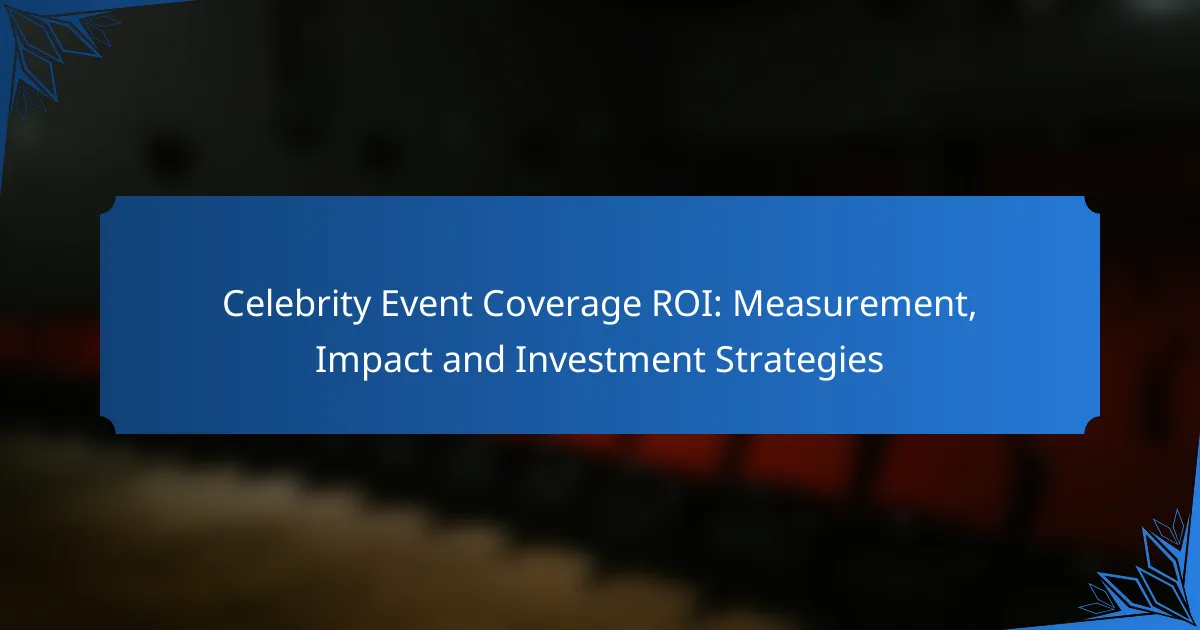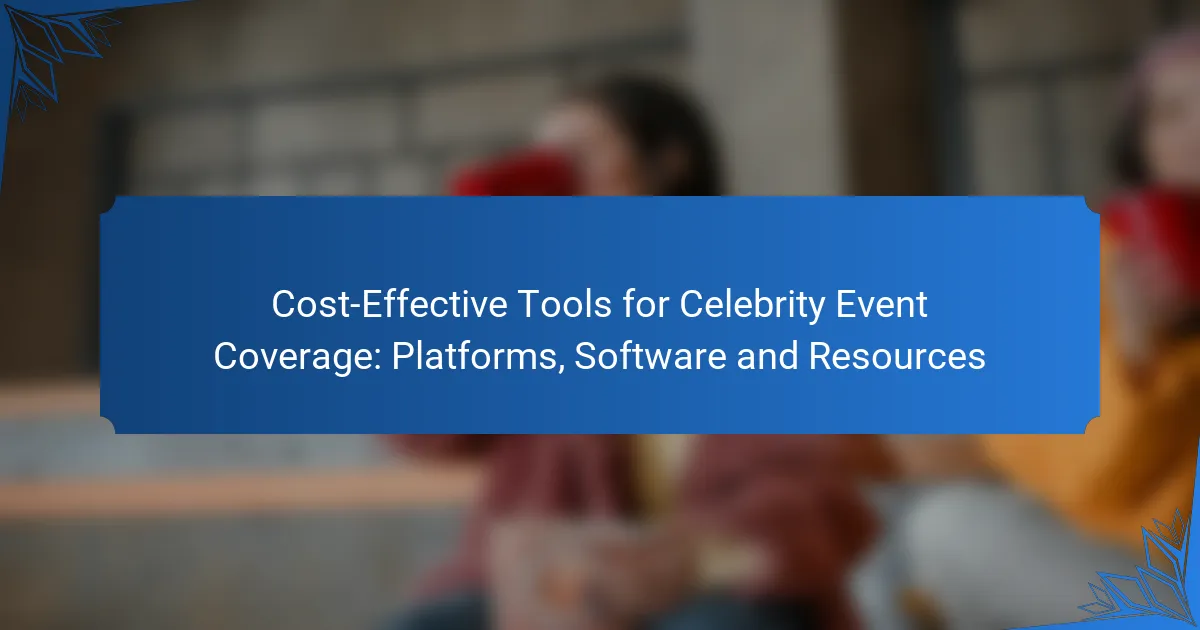Budgeting for celebrity event coverage requires a keen understanding of various costs, including personnel, venue fees, and marketing expenses. By implementing effective cost management strategies and efficiently allocating resources, event organizers can maximize impact while staying within a limited budget. This approach not only ensures a successful event but also enhances the overall experience for attendees and participants alike.

How to budget for celebrity event coverage in Los Angeles?
Budgeting for celebrity event coverage in Los Angeles involves understanding the various costs associated with planning and executing the event. Key areas to focus on include personnel, venue fees, equipment rentals, and marketing expenses to ensure a comprehensive financial plan.
Identify key expenses
Start by listing all potential expenses related to the event. This includes costs for permits, insurance, catering, and transportation, which can vary significantly based on the scale of the event and the celebrity involved. For a small-scale event, expect to budget anywhere from a few thousand to tens of thousands of dollars.
Consider creating a detailed expense sheet to track these costs. This will help you identify areas where you can cut back or where additional funding may be necessary.
Estimate personnel costs
Personnel costs are often one of the largest components of your budget. This includes fees for event planners, security staff, photographers, and other essential personnel. In Los Angeles, hourly rates can range from $20 to $150 or more, depending on the role and experience level.
To manage these costs effectively, consider hiring freelancers or part-time staff rather than full-time employees, especially for smaller events. This can help keep your budget flexible and manageable.
Allocate for venue fees
Venue fees in Los Angeles can vary widely based on location, size, and amenities. Popular venues may charge several thousand dollars for a single day, while smaller or less popular spaces might be more affordable. Always factor in additional costs such as cleaning fees or deposits.
Research multiple venue options and negotiate terms to find the best fit for your budget. Booking during off-peak times can also lead to significant savings.
Include equipment rentals
Equipment rentals are essential for any event, covering items like audio-visual gear, lighting, and furniture. In Los Angeles, rental costs can range from hundreds to thousands of dollars, depending on the quality and quantity of equipment needed.
To optimize costs, consider bundling rentals from the same supplier, which may offer discounts for larger orders. Always compare prices from different rental companies to ensure you get the best deal.
Plan for marketing expenses
Marketing is crucial for promoting your celebrity event and can include costs for social media ads, print materials, and influencer partnerships. Depending on your strategy, marketing expenses can range from a few hundred to several thousand dollars.
Focus on targeted marketing efforts that reach your specific audience. Utilize social media platforms effectively to maximize your outreach while keeping costs low. Collaborating with local influencers can also enhance visibility without breaking the bank.
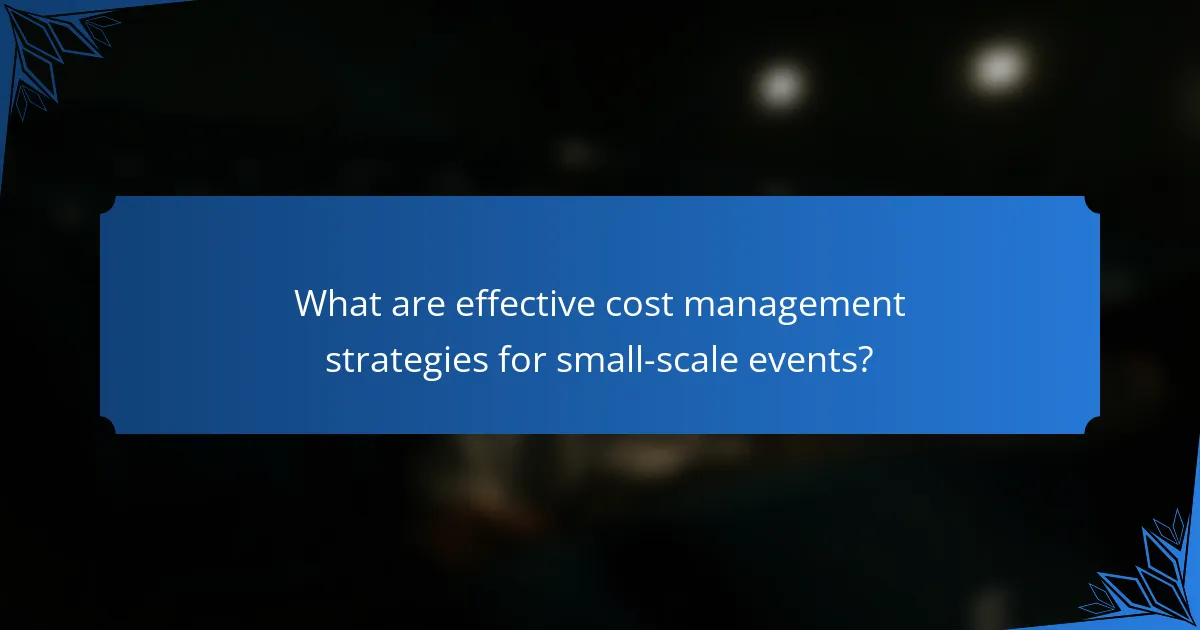
What are effective cost management strategies for small-scale events?
Effective cost management strategies for small-scale events focus on maximizing resources while minimizing expenses. By negotiating with vendors, utilizing local talent, and implementing digital marketing, event organizers can achieve a successful event within a limited budget.
Negotiate with vendors
Negotiating with vendors is crucial for reducing costs in event planning. Start by obtaining multiple quotes to understand the market rate and leverage this information during discussions. Aim for discounts or bundled services, which can lead to significant savings.
Consider offering vendors exposure or promotional opportunities at your event in exchange for reduced rates. Building strong relationships can also lead to better deals in the future, so maintain open communication and express appreciation for their services.
Utilize local talent
Hiring local talent can significantly cut costs associated with travel and accommodation for performers or speakers. Local artists, musicians, and speakers often provide unique insights and connections to the community, enhancing the event’s appeal.
Research local talent agencies or community boards to find affordable options. Engaging with local universities or colleges can also yield fresh talent at lower rates, as students often seek opportunities to gain experience and exposure.
Implement digital marketing
Digital marketing is a cost-effective way to promote small-scale events. Utilize social media platforms to reach a wider audience without the high costs associated with traditional advertising. Create engaging content that encourages sharing to amplify your reach.
Consider using email marketing to target specific groups who may be interested in your event. Tools like Mailchimp or Constant Contact offer affordable plans that can help manage your outreach efficiently. Track engagement metrics to refine your strategy and maximize impact.
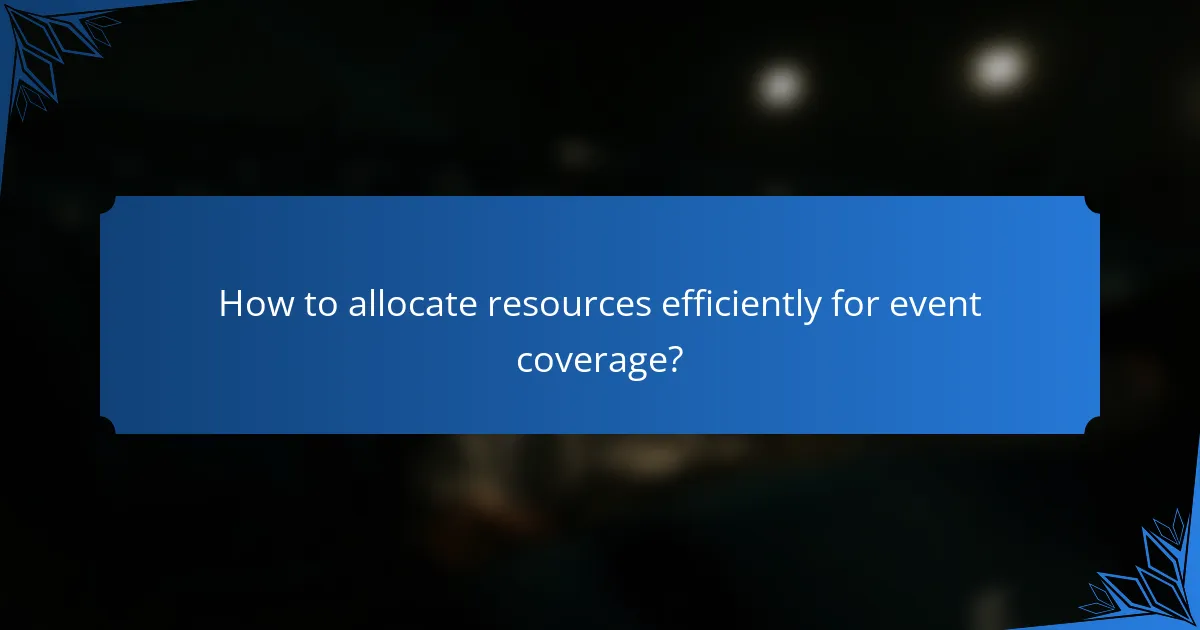
How to allocate resources efficiently for event coverage?
Efficient resource allocation for event coverage involves strategically distributing your budget, personnel, and equipment to maximize impact while minimizing waste. Focus on key areas that will deliver the most significant results and ensure that every dollar spent contributes to the overall success of the event.
Prioritize high-impact areas
Identifying high-impact areas is crucial for effective resource allocation. Focus on elements that will enhance visibility and engagement, such as social media promotion, high-quality video production, and strategic partnerships. For instance, investing in a skilled photographer or videographer can yield better content that resonates with your audience.
Consider conducting a SWOT analysis (Strengths, Weaknesses, Opportunities, Threats) to determine which aspects of your event coverage will provide the most value. This approach helps in making informed decisions about where to allocate resources for maximum effect.
Use project management tools
Project management tools streamline the planning and execution of event coverage by centralizing tasks, timelines, and resources. Platforms like Trello, Asana, or Monday.com allow teams to collaborate effectively, assign tasks, and track progress in real-time. This transparency helps ensure that resources are used efficiently and deadlines are met.
Utilize these tools to create checklists for each phase of your event coverage, from pre-event planning to post-event analysis. This structured approach minimizes oversights and keeps the team aligned on priorities and responsibilities.
Track expenses in real-time
Real-time expense tracking is essential for maintaining budget control during event coverage. Use accounting software or apps like QuickBooks or Expensify to monitor spending as it occurs. This practice helps prevent budget overruns and allows for quick adjustments if certain areas exceed expectations.
Establish a budget with clear categories and limits for each aspect of your event coverage. Regularly review these figures against actual spending to identify discrepancies and make informed decisions about reallocating resources as needed. Aim to keep a buffer of around 10-15% of your total budget for unexpected expenses.

What are the best practices for small-scale celebrity event coverage?
Effective small-scale celebrity event coverage requires strategic planning and resource management to maximize impact while minimizing costs. Focus on engaging local audiences, utilizing social media, and exploring live streaming options to enhance visibility and engagement.
Engage with local influencers
Collaborating with local influencers can significantly amplify your event’s reach without a hefty budget. Identify influencers who resonate with your target audience and have a genuine connection to the celebrity or event theme.
Consider offering them exclusive access or behind-the-scenes experiences in exchange for coverage. This can lead to organic promotion through their social media channels, increasing your event’s visibility within the community.
Leverage social media platforms
Social media is a powerful tool for small-scale event coverage, allowing real-time updates and engagement with audiences. Create a dedicated event hashtag to encourage attendees to share their experiences and connect with others.
Utilize platforms like Instagram and Twitter for live updates, and consider creating engaging content such as polls or Q&A sessions to foster interaction. Regularly monitor engagement metrics to adjust your strategy and maximize outreach.
Utilize live streaming options
Live streaming can bring your event to a broader audience without incurring significant costs. Platforms like Facebook Live, Instagram Live, or YouTube allow you to broadcast key moments, making it accessible to those who cannot attend in person.
Ensure you have a reliable internet connection and consider using a multi-camera setup for a more dynamic viewing experience. Promote the live stream in advance to build anticipation and encourage participation from both local and remote audiences.
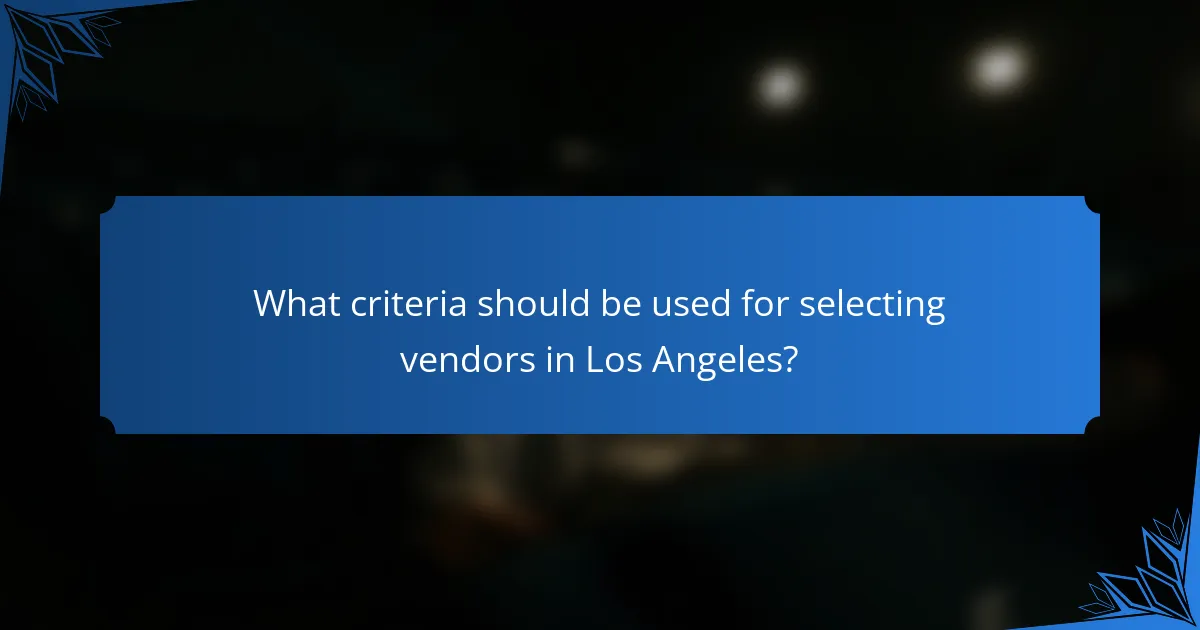
What criteria should be used for selecting vendors in Los Angeles?
Selecting vendors in Los Angeles requires careful consideration of their reliability, reputation, and pricing. Key criteria include evaluating past performance, checking client testimonials, and assessing pricing structures to ensure you choose the best fit for your event needs.
Evaluate past performance
When evaluating past performance, review a vendor’s history with similar events. Look for evidence of successful execution, adherence to timelines, and overall client satisfaction. A vendor with a proven track record in Los Angeles will likely understand local nuances and regulations.
Request case studies or examples of previous work to gauge their capabilities. Consider how they handled challenges and whether they met or exceeded client expectations.
Check client testimonials
Client testimonials provide insight into a vendor’s reliability and service quality. Seek out reviews on platforms like Google, Yelp, or industry-specific sites to gather a range of opinions. Pay attention to feedback regarding communication, professionalism, and the ability to deliver on promises.
Additionally, ask the vendor for references from past clients. Direct conversations can reveal valuable information about their experiences and satisfaction levels.
Assess pricing structures
Understanding a vendor’s pricing structure is crucial for budget management. Request detailed quotes that outline all costs, including any potential hidden fees. Compare these quotes against similar vendors to ensure you are getting a fair deal.
Consider whether the vendor offers flexible pricing options, such as package deals or discounts for larger events. This can significantly impact your overall budget and help you allocate resources more effectively.


